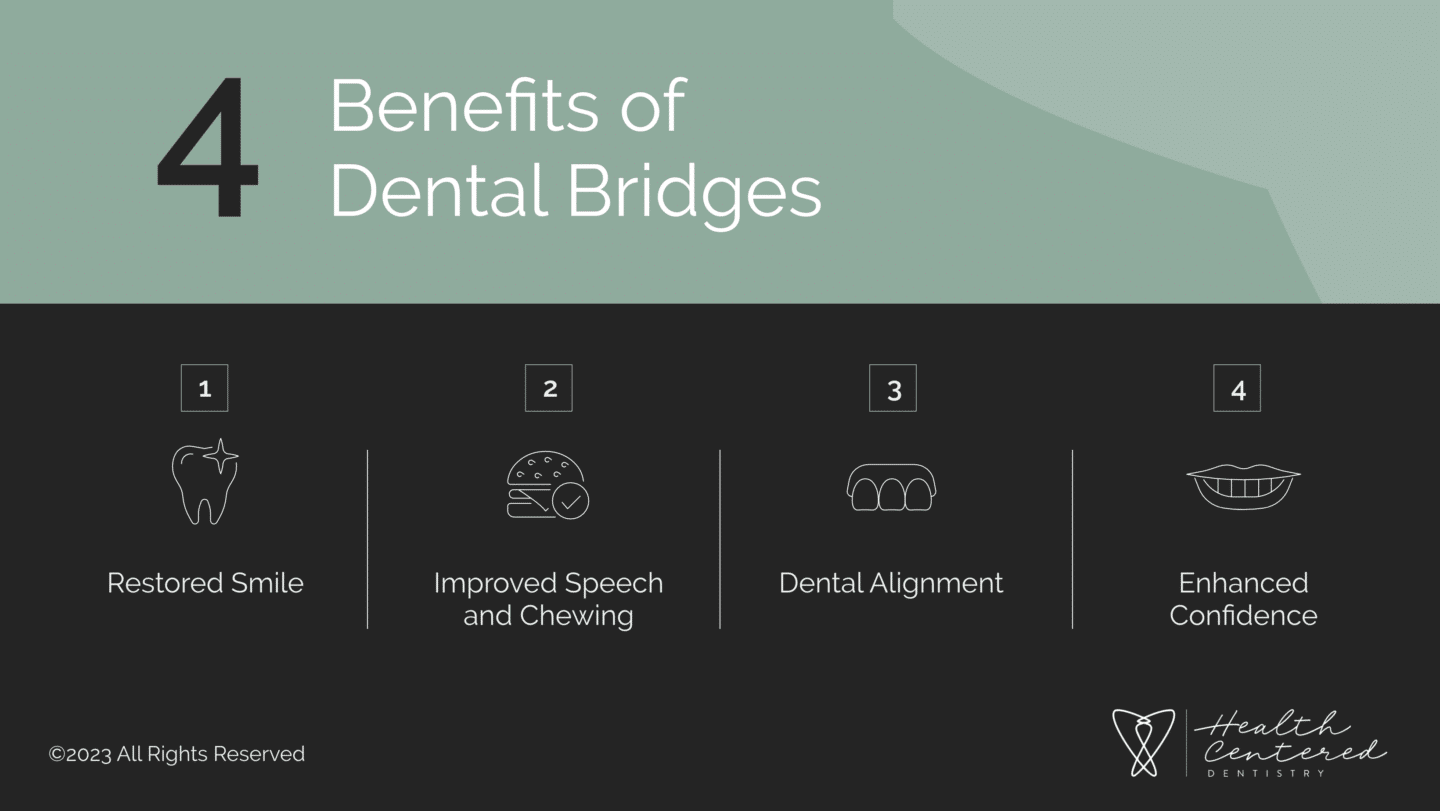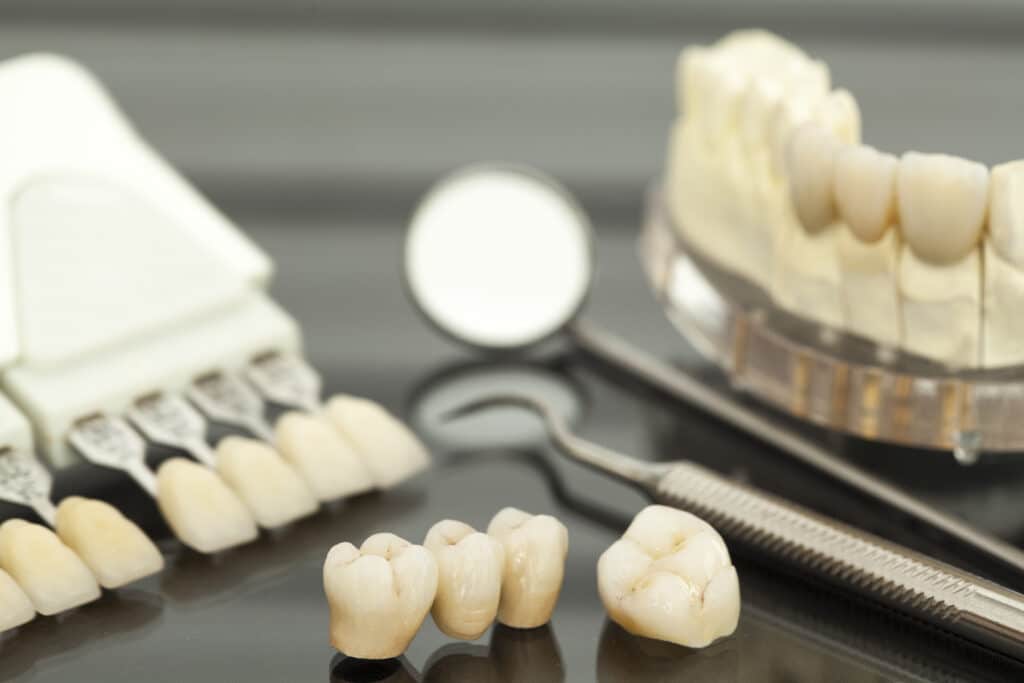When you meet someone, one of the first things a person notices about you is your smile. But if you have missing teeth, smiling may be difficult or cause you to become self-conscious. As such, maintaining a healthy and beautiful smile is a priority for many individuals. However, tooth loss can significantly impact both the aesthetic appeal and functionality of your mouth. Thankfully, we have a solution, and dental bridges offer an effective remedy for restoring missing teeth.
In this blog post, we will explore the procedure, benefits, and cost of correcting lost teeth with dental bridges in Anchorage at Health Centered Dentistry, enabling you to make an informed decision about your oral health.
Are you looking for a dentist in Anchorage with experience in restoring smiles? Reach out to Health Centered Dentistry today and schedule an appointment.
Understanding Dental Bridges
In a nutshell, a dental bridge is a fixed prosthetic device for replacing missing teeth. More specifically, these are used to fill the gap created by one or more missing teeth. It’s also good to note that dental bridges are not the same as dentures. This is because the bridge itself consists of an artificial tooth, known as a pontic, which is anchored by dental crowns placed on surrounding teeth or dental implants. This structure “bridges” the gap, restoring the appearance, alignment, and functionality of your smile.
It’s important to be aware that a full dental evaluation is going to be needed before it’s determined that a dental bridge is right for you. This is because replacement teeth need to be custom-made and anchored to healthy teeth, and the overall condition of your mouth will need to be assessed prior to being fitted for a dental bridge.
Benefits of Dental Bridges

The good news is that there are several benefits for tooth replacements and artificial teeth, And choosing dental bridges for tooth restoration offers the following advantages:
- Restored Appearance: Dental bridges fill the gaps created by missing teeth, enhancing the aesthetics of your smile and facial structure. They are customized to blend seamlessly with your natural teeth, providing a natural-looking result.
- Improved Speech and Chewing: Missing teeth can affect your ability to speak clearly and chew food properly. Dental bridges restore your ability to enunciate words and enjoy a varied diet without restrictions.
- Dental Alignment: A gap left by a missing tooth can cause adjacent teeth to shift or tilt over time, resulting in misalignment. Dental bridges prevent such movement and help maintain proper dental alignment.
- Enhanced Confidence: Dental bridges can have a positive impact on your self-esteem, as they restore your smile and overall dental function. You can feel confident and comfortable in social and professional situations.
The Cost of Dental Bridges in Anchorage
The cost of dental bridges can vary depending on several factors, including the number of missing teeth, the materials used, and the complexity of the procedure. Additionally, dental insurance coverage may influence the final cost. This is why it’s advisable to consult with your dentist and insurance provider to determine the exact expenses involved.
While dental bridges may require an initial investment, they are a long-term solution that can provide significant benefits for your oral health, overall well-being, and quality of life.
How Long Do Dental Bridges Last?
Dental bridges are designed to be durable and long-lasting, but their lifespan can vary depending on various factors, including oral hygiene practices, regular dental care, and the materials used in the bridge construction.
On average, dental bridges can last between 5 to 15 years or even longer with proper care. However, it is important to note that they may eventually require replacement due to natural wear and tear over time.
5 Factors That Influence the Lifespan of a Dental Bridge
- Oral Hygiene
Maintaining good oral hygiene is crucial for the longevity of your dental bridge. Regular dental cleanings, brushing, flossing, and rinsing with an antibacterial mouthwash help prevent plaque buildup and gum disease, which can impact the supporting teeth and the bridge itself. - Dental Check-ups
Regular dental check-ups are essential for monitoring the condition of your dental bridge. During these visits, your dentist will examine the bridge, supporting teeth, and surrounding gums to ensure everything is in good shape. Any signs of wear, damage, or decay can be addressed promptly to extend the lifespan of the bridge. - Material Selection
Dental bridges can be made from various materials, including porcelain-fused-to-metal, all-ceramic, or zirconia. Each material has its own strengths and durability. Porcelain and zirconia bridges are known for their superior aesthetics and resilience, while metal-based bridges offer strength but may be less aesthetically pleasing. Discussing the best material choice with your dentist can help determine the longevity of your bridge. - Bite Force and Habits
Excessive biting forces, such as grinding or clenching teeth (bruxism), can exert additional stress on the bridge and supporting teeth, potentially shortening their lifespan. If you have such habits, your dentist may recommend a night-guard or other protective measures to minimize the impact on the bridge. - Changes in Oral Health
Over time, changes in oral health, such as gum recession, bone loss, or tooth decay, can affect the stability and integrity of the dental bridge. Prompt treatment of any underlying oral health issues is vital to maintaining the bridge’s longevity.
While dental bridges are designed to be durable, it is possible for them to require replacement. If your dental bridge becomes loose, damaged, or fails to function properly, it’s essential to consult your dentist as soon as possible. Your dentist will evaluate the situation and recommend appropriate measures, which may include repairing or replacing the bridge.
5 Types of Dental Bridges
The choice of the dental bridge type depends on various factors, including the location of the missing tooth, the condition of the adjacent teeth, your oral health, and your preference. As such, it’s best to consult with a dentist who can assess your specific situation and recommend the most suitable type of dental bridge for you.
- Traditional Dental Bridges
This is the most common type of dental bridge. It involves creating a crown for the tooth or implant on either side of the gap and placing a pontic (artificial tooth) between them. The crowns are cemented onto the natural teeth or implants on either side, providing support for the pontic. - Cantilever Bridge
This type of bridge is used when there is only one natural tooth next to the gap. The pontic is supported by a single crown cemented to the adjacent tooth. Cantilever bridges are not as common as traditional bridges and are usually used in specific cases. - Maryland Bridge (Resin-Bonded Bridge)
Maryland bridges are made of a framework of metal or porcelain with a porcelain or composite resin pontic. The framework has small metal or porcelain wings on each side, which are bonded to the backside of the adjacent teeth using a resin. This type of bridge is a more conservative option as it requires minimal preparation of the adjacent teeth. - Implant-Supported Bridge
In this type of bridge, dental implants are used to support the pontic instead of crowns on natural teeth. Dental implants are titanium posts that are surgically placed into the jawbone, providing a stable foundation for the bridge. Implant-supported bridges are considered a highly durable and long-lasting solution. - Temporary Bridge
A temporary bridge, also known as a provisional bridge or interim bridge, is a temporary dental restoration used to replace missing teeth until a permanent solution, such as a dental bridge or dental implant, can be placed. It serves as a temporary measure to restore aesthetics, tooth function, and prevent shifting of adjacent teeth while the final restoration is being prepared or until the patient’s oral health is stabilized.
Dental Bridges at Health Centered Dentistry in Anchorage
At Health Centered Dentistry in Anchorage, we provide a variety of dental bridges. In addition, our expert dental team provides the best dental care that takes into account the best path forward for your dental health.
At Health Centered Dentistry, you’ll start with a consultation so that we can examine your mouth, assess the condition of your teeth, and recommend the best options for you.
When you choose HCD, you’re partnering with the best in Anchorage for dental health. We’re always mindful of how your oral health affects you. Our amazing dental team is here to help you understand the best choice for dental bridges in Anchorage.
Looking for a dental care expert for dental bridges in Anchorage? Set an appointment at Health Centered Dentistry to find the best solutions for your individual needs!


